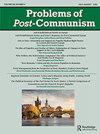制度信任、经济满意度与腐败感知的相互关系
IF 2
2区 社会学
Q2 POLITICAL SCIENCE
引用次数: 0
摘要
摘要腐败感知指数通常被用来反映一个国家的真实腐败程度。本文研究了制度因素感知对腐败感知的潜在影响。通过对亚美尼亚所有地区为期三年的调查数据,我认为,经济认知和对制度的信任,通过削弱个人对国家整体状况的满意度,直接或间接地影响腐败认知。进一步的中介分析表明,对国家整体形势的满意度是将腐败感知与经济感知和对制度的信任联系起来的基石。讨论了政策影响和进一步的研究途径。披露声明这篇文章是在作者还是密歇根大学安娜堡分校的富布赖特研究员时发起的,在他还是德国KAAD学者时被接受发表。作者感谢Dmitry Gorenburg和两位匿名审稿人为早期版本所花的时间和提供的有用意见。世界银行- https://www.worldbank.org/en/news/press-release/2012/11/28/social-snapshot-and-poverty-in-armenia.print.2。高加索研究中心- 2008 - 2010年家庭腐败调查。https://www.crrc.am/wp-content/uploads/2019/04/2010_Corruption_Household_Survey_Report_English.pdf.4。附录b提供了对变量的更详细的描述。附加信息资金支持这项工作。当我开始写这篇文章时,我是富布赖特学者;当我写完这篇文章[KAAD]时,我成为了KAAD的学者。本文章由计算机程序翻译,如有差异,请以英文原文为准。
Interrelation between Institutional Trust, Satisfaction of Economy, and Corruption Perception
ABSTRACTCorruption perception indices are conventionally used as a proxy for mirroring the real corruption level in a country. This article studies the potential impact of the perception of institutional factors on corruption perception. Using a three-year survey dataset from all regions of Armenia, I argue that economic perception and trust in institutions directly and indirectly influence corruption perception by undermining individuals’ satisfaction with the country’s overall situation. Further mediation analysis manifests that satisfaction with the country’s overall situation is the cornerstone linking corruption perception with economic perception and trust in institutions. Policy implications and further research avenues are discussed. Disclosure StatementThe article was initiated when the author was a Fulbright fellow at the University of Michigan, Ann Arbor, and it was accepted for publication when he was a KAAD scholar in Germany.AcknowledgmentsThe author thanks Dmitry Gorenburg and two anonymous reviewers for their time and useful comments on earlier versions.Notes1. The World Bank – https://www.worldbank.org/en/news/press-release/2012/11/28/social-snapshot-and-poverty-in-armenia.print.2. The Caucasus Research Center – Corruption Survey of Households 2008–2010.3. https://www.crrc.am/wp-content/uploads/2019/04/2010_Corruption_Household_Survey_Report_English.pdf.4. More detailed description of variables is presented in Appendix B.Additional informationFundingThis work was supported by the I was a Fulbright Scholar when I started the article [Fulrbight]; and a KAAD scholar when I finished the article [KAAD].
求助全文
通过发布文献求助,成功后即可免费获取论文全文。
去求助
来源期刊

Problems of Post-Communism
POLITICAL SCIENCE-
CiteScore
4.00
自引率
12.50%
发文量
33
期刊介绍:
The post-communist countries are the most rapidly changing societies of Europe and Asia. For insight into this twenty-first century revolution, there is no better source than Problems of Post-Communism. Emphasis is placed on timely research covering current economic, political, security, and international developments and trends in Russia and China, Central Europe and Central Asia, Latin America, and Southeast Asia. Clarity and readability make the articles fully accessible to researchers, policy makers, and students alike.
 求助内容:
求助内容: 应助结果提醒方式:
应助结果提醒方式:


